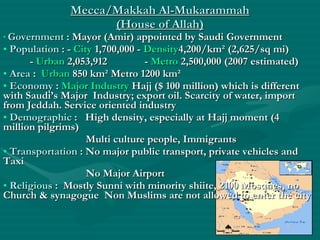Mecca Planning
- 1. Mecca/Makkah Al-Mukarammah (House of Allah) Government : Mayor (Amir) appointed by Saudi Government Population : - City 1,700,000 - Density 4,200/km² (2,625/sq mi) - Urban 2,053,912 - Metro 2,500,000 (2007 estimated) Area : Urban 850 km ² Metro 1200 km² Economy : Major Industry Hajj ($ 100 million) which is different with Saudi’s Major Industry; export oil. Scarcity of water, import from Jeddah. Service oriented industry Demographic : High density, especially at Hajj moment (4 million pilgrims) Multi culture people, Immigrants Transportation : No major public transport, private vehicles and Taxi No Major Airport Religious : Mostly Sunni with minority shiite, 2100 Mosques, no Church & synagogue Non Muslims are not allowed to enter the city
- 2. Major Issues The increasing number of Pilgrims leads to the expanding areas of the holy Mosque and also increasing the residential facility in the city The enlargement of the Mosque which required removing houses and other structures from the area immediately surrounding it New housing which had to be established in new areas away from the centre of the city No public transport for local residents and pilgrims, both during pilgrimage or outside pilgrimage season Water is scarce and food must be imported from Jeddah, or outside Makkah
- 3. Critical Land Use Planning Issue Low Efficiency of New Residential Layouts and The Availability, and Quality or Residential “ Barha ” The Threat of Sacred Place; New Construction of Modern Residential and Commercial Development is Causing The Destruction of Historic Islamic Buildings and is Commercializing The Holy City
- 4. Critical Community Development Issue The congestion during the Hajj in the city The High Cost to rent Accommodation for pilgrims who come with limited budget The need of government awareness in planning and development issue that will ensure the improvement of community residential and preserve traditional-Arab values The environmental destruction in rural areas surrounding Makkah due to the industrialization and urbanization
- 5. Form of Governance Mecca is governed by the Municipality of Mecca , headed by a mayor (Also known as Amir ) appointed by the Saudi Government. The current mayor of the city is Osama Al-Bar . A municipal council of fourteen locally elected members is responsible for the functioning of the municipality. Mecca is the capital of Makkah Province, which includes neighboring Jeddah. The governor was Prince Abdul Majeed bin Abdul Aziz from 2000 until his death in 2007. On May 16, 2007, Prince Khalid al Faisal was appointed as the new governor. The Mayor and municipal council have limited authority and power. The King of Saudi Arabia in his role as protector of the two holiest cities of Islam, Mecca and Madinah, which had traditionally been the role of the Caliph (but soon the caliphate was to lose political control over the Arabian peninsula), later falling to the Grand Sharif of Mecca.





